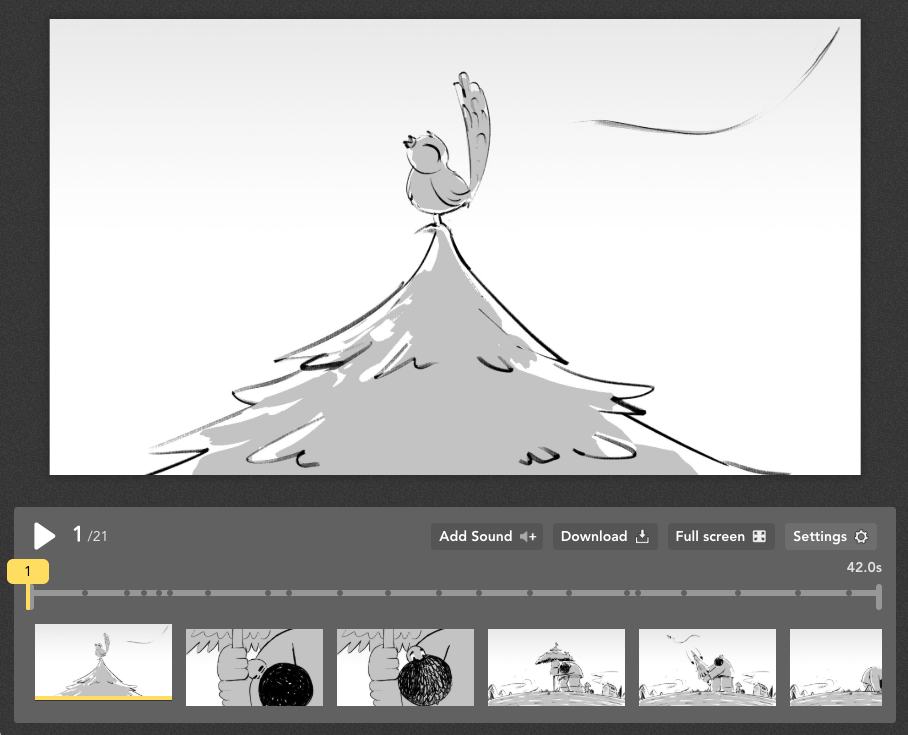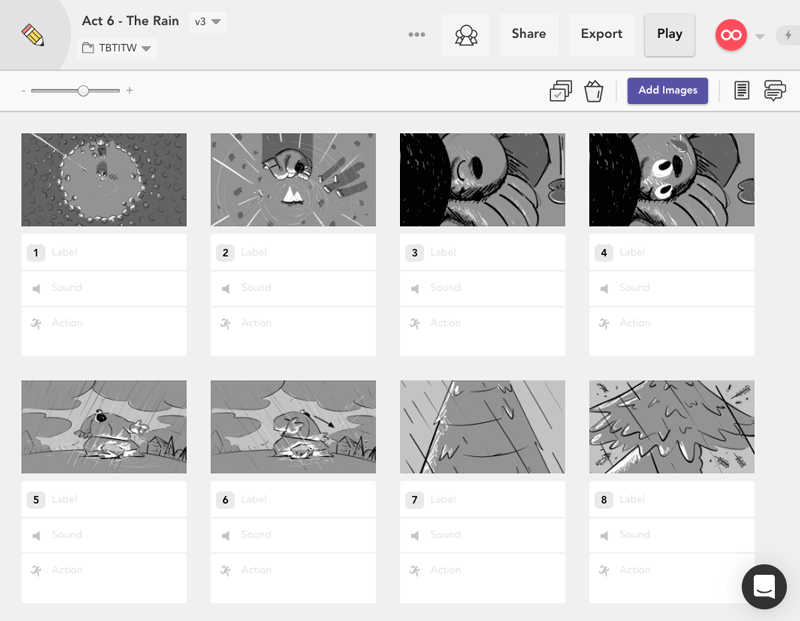What is an Animatic?
An animatic is defined as series of images played in sequence, often with a soundtrack. In essence, it's an animated storyboard.
- What's the definition of an animatic?
- Animatics in pre-production
- Animatic vs Storyboard - what's the difference?
- Animatic vs Animation - what's the difference?
- What are the benefits of an animatic?
The Shortcut to Effective Storyboards.
Boords is an easy-to-use storyboarding tool to plan creative projects.
Get Started for FreeWhat's the definition of an animatic?

The goal of an animatic is to define the timing for a piece of moving image. When used with a soundtrack, they're a quick and easy way to get a sense of a finished piece of moving image.
Animatics are created by playing a series of images in order and changing the timing on each frame. Timings changes are used to create a sense of pace.
Originally, animatics were created by filming drawings with a camera, then editing the film to various scenes. Today you can create an animatic in Photoshop, After Effects, or specialist animatic software like Boords.
In addition to traditional methods, AI-powered tools are emerging to streamline the animatic creation process. These AI storyboard generators use AI to automatically generate storyboards from scripts, text descriptions, or even sketches. This can significantly reduce the time and effort required to create an animatic, allowing creators to iterate and experiment more quickly.

Animatics are at the heart of the pre-production process
Pre-production is the multi-stage process which happens before a film or animation comes to life. Animatics are made after storyboarding, but before the design phase:
| Name | Purpose | |
|---|---|---|
| Stage 1 | Concepting | Define your idea |
| Stage 2 | Scripting | Draft your story |
| Stage 3 | Storyboarding | Plan your scenes |
| Stage 4 | Animatic | Define pace & timing |
| Stage 5 | Design | Define visual approach |
| Stage 6 | Logistics | Plan the production process |
Animatic vs Storyboard
Animatics use the same images as storyboards, but stitched together in sequence and rendered as video.

Although animatics and storyboards share the same images, there are some fundamental differences between the two:
| Animatic | Storyboard | |
|---|---|---|
| Low-res images | ✅ | ✅ |
| Written frame descriptions | ✅ | |
| Subtitles | ✅ | |
| Video output | ✅ | |
| Varying frame lengths | ✅ | |
| Audio/Soundtrack | ✅ |
Animatic vs Animation
Animatics are used to plan an animation, and use low-resolution images to convey timing, rather than the look and feel of the final piece. An animatic is the pre-cursor to the final animation, and is a key part of the planning process.
This example from Tend shows how an animatic is used to guide the final animation. The key scenes have been sketched (or 'scamped') and timed out. These timings are then used as a guide by the animators working on the final piece.

Get your FREE Filmmaking Storyboard Template Bundle
Plan your film with 10 professionally designed storyboard templates as ready-to-use PDFs.
What are the benefits of an animatic?
Animatics are quick to produce
If you've already created a storyboard for your film or animation, it's easy to make an animatic using your storyboard images. Specialist software like Boords allows you to turn your storyboards into animatics automatically.
Animatics are a reference point
When working on your final animation, you can refer back to your animatic to get a reference for frame timing. Without this, it's easy to get lost in the detail of your film and lose sight of the overarching story you're telling.
Animatics help you make quick changes
Because animatics use working sketching, not final images, you won't feel bad about ditching a scenes if it doesn't work. Saying goodbye to a cherished piece of character design in a finished animation can be much more difficult.
Animatics create consensus
An animatic is the first time your team will have seen your film in motion. It's the perfect opportunity for stakeholders to air their thoughts on how the piece feels, and for the creative team to make changes.
Animatics save you time (and money)
Animatics are useful because you can get a sense of the timing of a piece, without spending hours filming (or in the case of animation, drawing) the finished piece. They help you decide what works, and what doesn't before you commit time and resources. Creating film or animation is an expensive business. An animatic is the most efficient way of bridging the gap between planning and production.